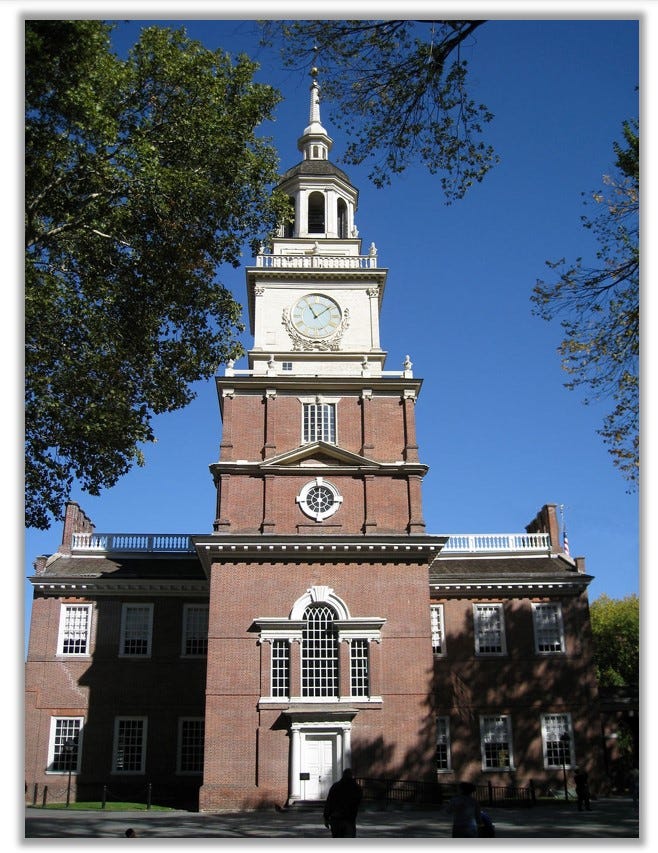TDIH: Pennsylvania's Ratifying Convention
A Philadelphian mob literally hauled two state legislators through the streets.
On this day in 1787, the Commonwealth of Pennsylvania begins ratification debates on the United States Constitution. You might imagine a bunch of dull Founders tamely approving a document, but the events that followed in Pennsylvania were anything but tame.
To the contrary, Pennsylvania’s story includes an irate minority, legislators hauled through the streets, and rousing speeches to huge crowds. Can you imagine what modern news stations would do with such raucous events today!?!
Trouble began soon after the Constitutional Convention adjourned on September 17. So-called anti-Federalists were opposed to the new Constitution that had been proposed. They worried about the lack of a Bill of Rights, and they felt that the national government created by the Constitution would be too powerful.
Would Pennsylvania ratify the document anyway?
On September 29, the Pennsylvania assembly was ready to adjourn, but many pro-Constitution members didn’t want to leave without first calling for a state ratifying convention. The anti-Federalists, of course, were in no such hurry. These members simply refused to attend the legislative meeting, knowing that the assembly would lack a quorum without them.
The pro-Constitution members would not be foiled. In the end, the sergeant-at-arms found two of the anti-Federalist members. With the help of a Philadelphian mob, these two men were literally hauled through the streets to the State House. They were forced to stay, creating a quorum, while the others voted to call for a ratifying convention.
Soon after this incident, one influential Pennsylvanian, James Wilson, gave a rousing speech outside of Pennsylvania’s State House. Wilson had been a delegate to the Constitutional Convention, and he was now a stalwart supporter of ratification.
“I will confess, indeed, that I am not a blind admirer of this plan of government,” he told the gathered crowd, “and that there are some parts of it which, if my wish had prevailed, would certainly have been altered. But, when I reflect how widely men differ in their opinions, . . . I am satisfied that anything nearer to perfection could not have been accomplished . . . . [I]t is the best form of government which has ever been offered to the world.”
Wilson’s remarks were subsequently reprinted and distributed widely, not only in Pennsylvania, but also in other states.
Pennsylvania’s ratifying convention was finally held from November 21 to December 12. The vote was predictable: 46 votes for ratification and 23 against. After the vote, the 23 anti-Federalists asked to have their objections printed as part of the record.
The request was denied.
Not to be thwarted, the minority instead published their objections as the Pennsylvania Minority Report. The Report was circulated throughout the country and was influential in creating a demand for a Bill of Rights.
You may remember that when the Constitution was initially approved by most states, it did not contain a bill of rights. Nevertheless, the matter was deemed important enough that it was almost immediately addressed by the First Congress. Twelve amendments were proposed to the states in September 1789. Ten of these would be ratified as our “Bill of Rights” by the end of 1791.
Perhaps the anti-Federalists in Pennsylvania got the last say after all.
Sources can always be found on my website, here.





Forming our Constitutional Republic was a messy task. Thankfully both sides worked through it and we ended up with the Bill of Rights too. It is also understood that it can be messy keeping our Republic. It certainly isn’t a once and done. There will always be differing opinions and viewpoints. The goal is to continue to work toward a more perfect union and protect the foundation of our beautiful nation. I always learn new things from your history posts, Tara, and often reminded of things I know. Thanks for the refresher courses.
Thank you Tara. The arguments against the ratification of the Constitution weren't all wrong, in my opinion. Certainly in hindsight, like 240 years, some provisions or limits may have been wise but it still is the greatest form of government ever created.